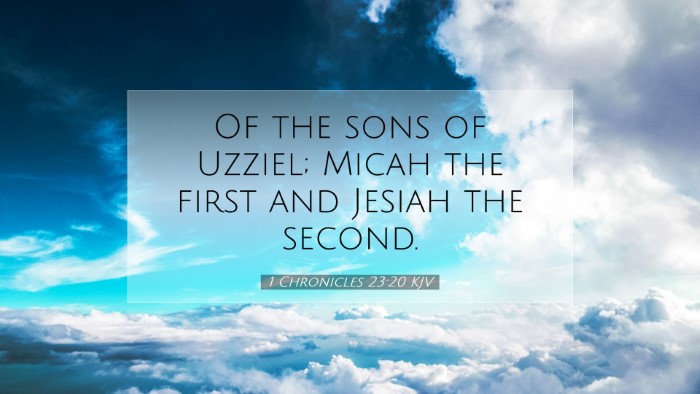Commentary on 1 Chronicles 23:20
Text of 1 Chronicles 23:20: "Of the children of Benjamin; their brethren: Eliab, and Abijah." (1 Chronicles 23:20, KJV)
Introduction
The passage before us, 1 Chronicles 23:20, comes at a crucial juncture in the Chronicler's narrative. It is part of a larger account detailing the organization of the Levitical priesthood under King David. This significant verse reminds us of the importance of the tribe of Benjamin in the service of God. Through an exploration of the historical and theological implications of this verse, we seek to glean insights that can inspire pastors, students, and scholars alike.
Historical Context
The book of Chronicles serves as a theological reflection on Israel’s history, particularly focused on the Southern Kingdom of Judah. The listing of the Benjamite families in this context highlights the inclusion of all tribes in the service of the temple and the Lord. Benjamin, a tribe rich in heritage, is closely tied to the story of Saul, the first king of Israel, and its role continues through the lineage of David.
According to Matthew Henry, this chapter represents a transitional phase in Israel's worship practices, moving from a tabernacle-based worship to a more established temple-based system under Solomon. The mention of the Benjamites indicates their continued significance in worship and leadership roles, despite their historical tensions with the tribes of Judah and Ephraim.
Theological Insights
From a theological standpoint, 1 Chronicles 23:20 emphasizes God's faithfulness in preserving His covenant people through times of transition. The inclusion of the Benjamites in the Levitical service reflects God’s intention to unite the tribes in worship and service, showing that leadership is not exclusive to one tribe but is a divine call available to all. Adam Clarke notes that while the Levites were set apart for direct service, the involvement of other tribes in sacred duties signifies inclusiveness in God’s plan for Israel.
The specific mention of Eliab and Abijah not only points to individual leaders but also encapsulates the broader divine orchestration of service roles within the community. It serves as a reminder that every tribe and every family has a place in God’s plans, which is a vital lesson for the contemporary church.
Pastoral Applications
For pastors and church leaders today, this verse serves as a potent reminder of the need for inclusivity in church leadership. Each member of the congregational family, much like Eliab and Abijah, has a role to play in the life of the church.
- Encouragement of Diverse Gifts: Just as the Benjamites had a distinct role, church leaders should recognize and cultivate the diverse gifts among their congregants.
- Unity in Leadership: The collaboration of the tribes demonstrates that unity in leadership can lead to more effective ministry and outreach.
- Empowerment of Lay Leaders: The passage challenges pastors to empower lay leaders in service, echoing the same historical principle present in ancient Israel.
Conclusion
As we reflect on 1 Chronicles 23:20, we’re invited into a deeper understanding of God’s providential plan for His people and the roles that different individuals play within that plan. The historical significance, theological implications, and practical applications of this verse extend beyond its immediate context, speaking to the universal call to service in the Kingdom of God.
In this way, the verse stands as a testament to God's faithfulness, encouraging believers in their unique roles and reminding them that every contribution matters in the larger tapestry of worship and service.


